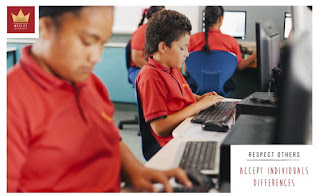Legal contexts and digital identities
This blog post aims to make connections between my own context of practice and general guidelines in promoting professional communication using social media sites.
I have examined social media policies within my organisation and also considered how the points raised relate to my own situation of building a professional network at Wesley Intermediate School.
The New Zealand Teachers council outlines the following guidelines and aims to provide professional standards for teachers to guide appropriate practice when communicating through social media-
The New Zealand Teachers council outlines the following guidelines and aims to provide professional standards for teachers to guide appropriate practice when communicating through social media-
Teachers have a professional obligation to develop and maintain professional relationships with learners based on the best interests of those learners. A teacher who is both aware of social media and a competent and confident user will be a role model for their learners and encourage them to become good digital citizens. Teachers Council (2015)
Some key safety and legal parameters to bear in mind when dealing with students are also covered by the Teachers Code of Conduct and the Registered Teacher Criteria. The guidelines spell out some pertinent behaviour that will protect teachers and learners in the digital context for example.
"Consider ethical risks that could arise. Act the same way when using social media, as you would in a face to face setting and consider setting up separate groups for specific teaching purposes. Keep your private and professional use of social media separate." (Teachers Council, 2015)The guidelines also state that its best to follow the school or center’s policies on dealing with information divulged to you as a teacher and to monitor content so that posts and discussions remain on-topic (Teachers Council, 2012). The Guidelines go on to say that the profession is a knowledge-building community and as a member of the profession you should seek and respond to opportunities to share knowledge and discuss concerns.
PB4L and ICT use at Wesley Intermediate School.

During the course of the other DCL assignments I have extensively developed and reviewed the school wide policies and procedures for implementing the social and ethical use of online content. I have created a series of PB4L lessons around putting these guidelines into practice. The main functional aspect of creating these lessons have been due the fact that when learners are taught explicitly, the expected behavior -they are more likely to exhibit the behavior during the lesson or activity (Lewis and Sugai- PBIS, 1999).
I have also collaborated with Gerhard Vermeulen (IT specialist) at my school to create a Kawa of Care (online contract) for students and teachers in order for online behaviour to stated clearly and agreed upon.
In Reflection of this Blog post -
We have tried to use the best approaches to teach our students and teachers about the Pb4L lessons for ICT and online behaviour. Students are shown examples of appropriate pro social behaviour and staff role model this in their day to practice. However I believe there is more room for improvement since reviewing the guidelines. I have personally come across staff using social media that goes against the guide lines and this will need to be addressed with them as stated in the professional aspect of the guidelines and the NZRTC.
References:
Lewis, T. J., & Sugai, G. (1999, 6 31). Effective
behavior support: A systems approach to proactive schoolwide management. Focus
on Exceptional Children, pp. 1-24.
New Zealand Teachers Council.(2012). Establishing safeguards.[video file]. Retrieved from https://vimeo.com/49216520
New Zealand Teachers Council (2012). Commitment to Parents/Guardians and Family/Whānau. [video file] Retrieved fromhttps://vimeo.com/49804201
New Zealand Teachers Council. (2015). Teachers & Social Media . Retrieved from http://www.teachersandsocialmedia.co.nz




No comments:
Post a Comment